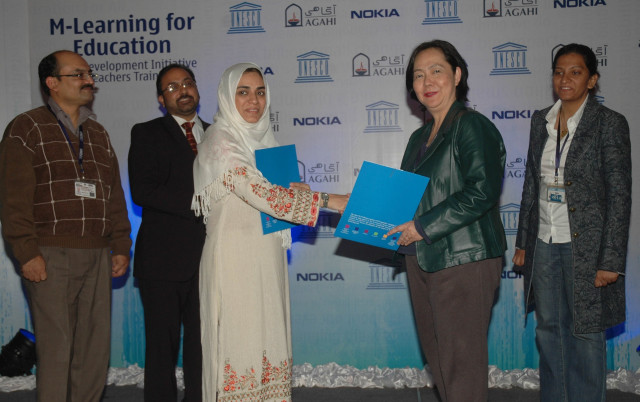M-learning for teachers: Three stakeholders come together to propose a unique solution
Mobile phones to be used to disseminate educational material.

Just as a team is only as good as the sum of its parts, a teacher is only as good as the study material he can access and disseminate. Even the most motivated teachers can only teach from material that is available to them, which is really not much outside urban centres.
This is where Unesco and Nokia’s new Mobile Learning Project for Teacher’s Professional Development comes in. The UN’s education and culture arm will work hand in hand with the telecom giant famed for its handshakes to create a system to help public school teachers in rural areas professionally develop using the Nokia Delivery Service (NDS).
According to Nokia Near East Business Development Manager EDX Rabia Nizami, the success of Nokia’s content delivery system is collaboration, and that is part of why the localised content is being developed by Agahi, a non-profit that provides communication tools and is Unesco’s implementing partner in Pakistan.
Unesco Pakistan Director and Representative Dr Kozue Kay Nagata said there are more cell phones in Pakistan than newspaper readers or computers. “Cell phones reach everyone, rich, poor, men, women, adults, and children. We want to deliver quality, quantity and inclusive training [through the project].”
However she cautioned that Unesco cannot support education in Pakistan forever and eventually the government will have to take over the responsibility. The training course will be developed into video files and transmitted via mobile internet to teachers.
Under the project, Nokia and Unesco will train 100 teachers who will then become trainers for other teachers, said Nizami.
Agahi’s Amir Jehangir believed the NDS is an ideal platform for the project. “It’s not about the set, It’s about the software and the accessibility it provides. Open sourcing the software is a big contribution from Nokia.”
Any phone running S40 (a Nokia-developed platform) can run the software, which given the relatively low price point of these phones and the universality of the brand locally should not be an issue for the target audience. Agahi has also promised to foot the internet bill for delivering the content for six months.
However, the mobile networks in the country will definitely hinder the effectiveness of the project. There is not a single 3G mobile operator in the country, with the best in the business still on edge, a technology that realistically offers download speeds of no more than 20 Kilobytes per second (KBps). Most mobile service providers in rural areas are still on GPRS, which gives a speed of no more than 3-4 KBps.
To add to the potential issues, mobile data services in Pakistan are constantly disrupted, making it near impossible to download large files. Receiving or making a phone call also disrupts internet connection. Given that the file size of educational videos will run into several megabytes (there are 1,024 kilobytes in a megabyte), one can only hope that a project with as much potential as this goes on to achieve its goals.
Published in The Express Tribune, December 23rd, 2011.



















COMMENTS
Comments are moderated and generally will be posted if they are on-topic and not abusive.
For more information, please see our Comments FAQ